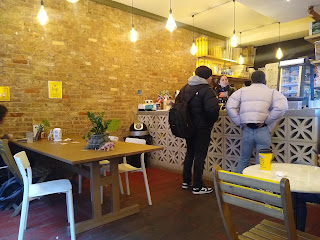 |
| At 787 Coffee in Greenwich Village, the coffee is pricey but the epiphanies are free |
Coffeehouses are more than places to buy coffee. The best ones are places to linger, to encounter both friends and strangers, supports for the local community as well as the local economy. In chapter 10 of his landmark The Great Good Place [DaCapo, 2nd ed, 1999], which popularized the concept of "third places," Ray Oldenburg describes the origins of democratic coffeehouse culture in London and Vienna:
In the coffeehouse, men from all parties and stations could mingle in innocence of the old traditions. In the absence of an established press, face-to-face discussion in the permissive atmosphere of these second-story halls represented a single and vital mode of democratic participation. In the process of this unprecedented mingling, people became sensitive to one anothers’ situations and found common interests and sympathies. They soon discovered, as well, the strength of their numbers and their mutual stake in individual freedom. (1999: 189)
London coffeehouses were also centers of business entrepreneurship, and headquarters for literary lions like John Dryden, Joseph Addison, and Daniel Defoe. At the same time, those coffeehouses, like pubs and bistros, could be oases for their customers, “correctives” from “whatever mental and emotional states the daily struggle induces” (1999: 184).
 |
| The splendid courtyard at Topolska 18, Belgrade |
At their best, coffeehouses are places to be, not just places to buy. Achieving this in America, however, is hindered by our car-centered design, which makes life in public into a series of errands, and/or the cost of real estate in major cities, where proprietors can’t afford the space or the time for customers to hang out.
I was visiting coffeehouses in New York City last month when I had a flash of clarity about
what it
feels like to be in a coffeehouse. The first two places I went had very little seating
relative to the stream of customers, clearly designed for grabbing and going rather than lingering. We did stay awhile, but I was always
conscious of the preciousness of the seat I occupied. The third had plenty of
seating but was messy and aesthetically unappealing. Only in the fourth was I able to
linger un-self-consciously, to watch and listen to the stream of people coming
in, and to write most of the blog post on Greenwich Village. Maybe it was
because it was Monday as opposed to Saturday or Sunday? The counterman
did describe business as “slow,” though it seemed steady to me.
 |
| Sunday morning at Brewhemia, Cedar Rapids (truth in blogging: 15 minutes later the line was out the door) |
 | |||
| Selection of baked goods at Cafe St. Pio | |
Ideally the place also should be in a walkable area, with its own footprint adding at most a small parking lot. (Come to think of it, my list resembles Jeff Speck’s criteria for walking that should be purposeful, comfortable, interesting and safe.)
Friendliness and whimsy are bonuses.
 |
| Men's room at the Early Bird downtown, which space is now occupied by the equally amusing Craftd |
Although we at Coe College lament the 2020 closing of our beloved Brewed Awakenings Coffeehouse, expanding our horizons just a bit to the core of Cedar Rapids gets us by my count eleven local coffee places. I patronize all eleven, because research, and am here to tell you each has its distinctive features that enhance a guest's experience. The four best of them feature:
· Enough Space: not so big that you feel like an atom, but not so small that you can’t relax, with a warm ambience. Two of my faves are located on street corners; all have large front windows none of which face east, so there’s the right amount of natural light in the morning. |
| Facing northwest and southwest, Cafe St. Pio anchors a key block in Czech Village |
 |
| Craftd downtown is closed Saturdays, but open Sundays |
 |
| payment jar for refills at Brewhemia |
 |
| Jacob's Coffeehouse in Washington's Capitol Hill neighborhood: cozy but not crowded |




No comments:
Post a Comment